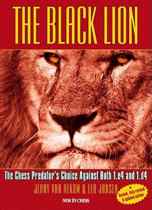Black Lion, The
Jerry Van Rekom, Leo Jansen

I have seen black panthers and black leopards but until now I had never heard of a black lion, that is until The Black Lion appeared in my mailbox. The second edition (fully revised and edited) of Jerry Van Rekom and Leo Jansens bible to the darker version of panthera leo is devoted to playing an aggressive version of the Philidor. Blacks problem in the Philidor proper is how to find a way to safely reach the tabiya at move five. The traditional move order, 1.e4 e5 2.Nf3 d6 3.d4 Nf6, allows White to gain an advantage by 4.dxe5 Nxe4 5.Qd5. To circumvent this, Van Rekom and Jansen propose two alternatives. The “Lions Den commences with 3…Nbd7 and the “Lions Yawn with 3…e5. The latter is well known and tested in many GM games, the former the property of Leo Jansen. The authors spend much time trying to prove the viability of Blacks setup after 3…Nbd7 4.f4, which must be the critical test.
Besides extensively analyzing 1.e4 d6 2.d4 Nf6 3.Nc3 e5 4.dxe5 and 3…Nbd7 4.f4, much attention is focused on the important Philidor sidelines arising after 3…Nbd7 4.Nf3 e5 5.Bc4 Be7 and now 6.Bxf7+, 6.dxe5 and 6.Ng5 followed by 7.Bxf7+. Though these lines do not occur as frequently as 6.0-0, they are essential to know for anyone who wants to play the Philidor. Jansen and Van Rekom suggest that after 6.0-0 Black play 6…h6 in the style of Major Hanham intending …Nf8, …g5 and …Ng6 but deferring these committal moves until after …c6 and …Qc7 have been played.
The subtitle of The Black Lion is The Chess Predators Choice Against Both 1.e4 and 1.d4. This may be so (perhaps an Old Indian against the latter or 1.d4 d6 2.c4 e5!?), but the prospective purchaser of this volume should understand that this book is about 1.e4 d6 2.d4 and not 1.d4 d6 2.c4.
The Black Lion is aimed at aggressive players from 1600-2200 who like to go their own way and dont want to have to learn tons of theory.
